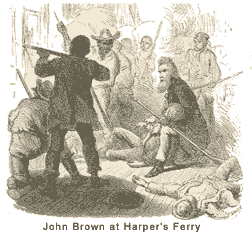John Brown, the fanatical abolitionist, had been in hiding since his activities in Bleeding Kansas in 1856, but was able to solicit funds from like-minded opponents of slavery for a new scheme. His plan was to establish a stronghold in the Blue Ridge Mountains of western Virginia and use it as a base for attacking slaveowners and for assisting runaways. He believed that once this effort was begun, it would touch off a general slave rebellion in the South.
 In the summer of 1859, Brown and his followers established themselves on a farm near Harper's Ferry, Virginia, a small community at the confluence of the Potomac and Shenandoah rivers not far from Washington, D.C. The presence of a federal arsenal and a rifle works made the town a vital part of Brown's plan.
On the evening of October 16, 1859, Brown and 21 supporters began a march toward Harper's Ferry. Early in the morning of the following day, they arrived on the outskirts of the community, cut the telegraph lines and moved in to occupy several of their targets. In the process they took several dozen hostages. Word of the raid spread rapidly and local militia forces gathered. The local soldiers were able to force Brown and his men into a small, brick engine house. One of Brown's sons came out under a white flag of truce, but was immediately shot and killed.
A railroad crew took word of the events at Harper's Ferry back to Washington where President James Buchanan dispatched federal soldiers. Those forces, led by Robert E. Lee, stormed the engine house and captured the badly wounded Brown and several of his men. In all, 10 of the insurgents were killed, including two blacks and both of Brown's sons.
Convinced of the justness of his cause, Brown refused to put forth an insanity defense; he and six others were found guilty and were hanged in December 1859.
The impact of John Brown's raid was felt in both the North and the South. In the North, Brown became a martyr in the eyes of the abolitionist minority; church bells tolled and flags were lowered in many New England towns on the day of the executions. Nevertheless, Brown’s violent assault upon federal authority was denounced by many Northern moderates; the fact that they did not support the institution of slavery did not mean they supported Brown.
The disapproval voiced by these Northerners was lost on most Southerners; the praise from the abolitionists was the only thing they heard. Slaveowners were increasingly convinced that the North was preparing for a widespread armed attack. Others in the South became terrified at the prospect of a general slave insurrection; these fears led to tightening of slave laws throughout the South.
The South was deeply angered by the events at Harper's Ferry.
In the summer of 1859, Brown and his followers established themselves on a farm near Harper's Ferry, Virginia, a small community at the confluence of the Potomac and Shenandoah rivers not far from Washington, D.C. The presence of a federal arsenal and a rifle works made the town a vital part of Brown's plan.
On the evening of October 16, 1859, Brown and 21 supporters began a march toward Harper's Ferry. Early in the morning of the following day, they arrived on the outskirts of the community, cut the telegraph lines and moved in to occupy several of their targets. In the process they took several dozen hostages. Word of the raid spread rapidly and local militia forces gathered. The local soldiers were able to force Brown and his men into a small, brick engine house. One of Brown's sons came out under a white flag of truce, but was immediately shot and killed.
A railroad crew took word of the events at Harper's Ferry back to Washington where President James Buchanan dispatched federal soldiers. Those forces, led by Robert E. Lee, stormed the engine house and captured the badly wounded Brown and several of his men. In all, 10 of the insurgents were killed, including two blacks and both of Brown's sons.
Convinced of the justness of his cause, Brown refused to put forth an insanity defense; he and six others were found guilty and were hanged in December 1859.
The impact of John Brown's raid was felt in both the North and the South. In the North, Brown became a martyr in the eyes of the abolitionist minority; church bells tolled and flags were lowered in many New England towns on the day of the executions. Nevertheless, Brown’s violent assault upon federal authority was denounced by many Northern moderates; the fact that they did not support the institution of slavery did not mean they supported Brown.
The disapproval voiced by these Northerners was lost on most Southerners; the praise from the abolitionists was the only thing they heard. Slaveowners were increasingly convinced that the North was preparing for a widespread armed attack. Others in the South became terrified at the prospect of a general slave insurrection; these fears led to tightening of slave laws throughout the South.
The South was deeply angered by the events at Harper's Ferry.